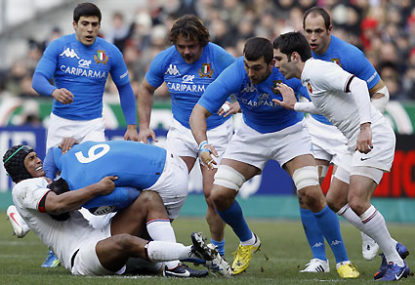Roar Guru

National teams, which embarked on a policy of using foreign-born players in their squad, do so because of a lack of depth or developing talent at their disposal.
Such examples included Italy with Argentine-born Sergio Parisse, Japan with Kiwi-born flanker Michael Broadhurst and recently Scotland with their Dutch-born winger Tim Visser and Kiwi winger Sean Maitland.
However, in recent months it has been the French who have been doing it, such as South African flanker Antonie Claassen and Fijian born winger Noa Nakaitaci. In addition, Castres scrum half Rory Kockott’s excellent performances in the Top 14 has led to rumours he might be called up when eligible to play for France next year.
Despite these talented players being called up it can be argued this highlights the lack of young home-grown French talent breaking through to France’s top teams.
Chief to blame is the mass influx of foreigners in the Top 14 where it has a detrimental effect to the national team’s fortunes.
The €10 million salary cap for the Top 14 compared to the English Premiership and Celtic/Italian Pro12 has allowed French clubs to acquire top players from Wales, Ireland, the Pacific Islands and the four southern hemisphere teams in the Rugby Championship.
For example, Toulon boast a star-studded foreign-born line-up of Jonny Wilkinson, Drew Mitchell and Matt Giteau coupled with the recent signings of South Africans Bryan Habana and Juan Smith.
Racing Metro on the other hand acquired Irish fly half Jonathan Sexton and Welsh centre Jamie Roberts along with the Argentine duo of Juan Martin Hernandez and Juan Imhoff.
With the abundance of foreign talents throughout the top teams of the Top 14 it means it is tough for young homegrown French players to break through to the first team.
There have been some success stories such as young centre Gael Fickou who broke into the Toulouse line-up last season and is going from strength to strength this season. He is one to watch but sadly these young success stories are few and far between.
The abundance of talent is hurting the national team’s fortunes at senior and youth level.
France’s U20s failed to reach the semi-finals in either the 2012 or this year’s Junior World Championship that they hosted.
But it was France’s performances in the Six Nations where their problems were exposed.
A deserving opening loss to Italy (which shows how much the Italians have improved as a result of having two teams in the Pro 12) in Rome was a poor way to start before defeats to Wales and England compounded misery within France.
Their only positives from the Six Nations, apart from the excellent Clermont centre Wesley Fofana, was a draw against Ireland in Dublin and beating Scotland in Paris so to avoid the wooden spoon.
Head coach Phillipe Saint-Andre was keen to point the blame his side’s woes in the Six Nations at the big clubs in the Top 14 focusing mainly on buying world-class foreign talent.
Moreover, another consequence of French clubs buying (some would say poaching) foreign players is those Welsh, Irish and to a smaller extent English clubs hurts France in an unexpected way.
Those clubs who have lost their top players to the Top 14 turn to their academies to develop young talent.
They can get game time in their domestic leagues along with the Heineken Cup and fulfil their potential as a result.
In a way it benefits France’s rivals especially as England and Wales have used their clubs’ academies to churn out young talent such as Wasps speedster Christian Wade along with London Irish’s Marland Yarde for England while Wales have Cardiff fly half Rhys Patchell who is one for the future.
Having world class foreign talent in the Top 14 is good for the league as it helps bring sponsors, grows attendance figures, as well as attracts lucrative TV rights, but French head coach Saint Andre is right to say it has contributed to the national team’s woes.
Out of the eight internationals the French have played this year they have lost six: a figure that would shame many ardent rugby fans in France.
As said before in previous articles the New Zealanders and South Africans have made a concentrated effort to develop their youth and allow fresh talent to break into their national side.
The French rugby authorities (known as the FFR) need a coherent plan to develop youth so players like Gael Fickou can be a common success story rather than a flash in a pan.
Moreover, Top 14 clubs have sent scouts to the Pacific Islands to try and unearth young talent. Clermont have entered into a partnership deal with Fijian club Nadroga. As part of the deal Fijian coaches spend time in France and access state of the art facilities while in return Clermont manage to find new stars from the Nadroga club to play for them like Noa Nakaitaci and Uwa Tawalo.
Some might say it is good for Nadroga because their coaches get experience in France that they can use when they head back home. But others argue it highlights the lack of depth within France that Top 14 clubs are poaching from the Pacific Islanders: stifling their development by having them declare for France instead of Fiji, Samoa or Tonga.
These stats obtained from ESPN Scrum should certainly worry the FFR in the paucity of young homegrown talent coming through. In the Top 14 2012–13 season none of the top three points scorers were French while from the 30 players who started for Clermont and Toulon in the Heineken Cup final only eight were eligible to play for France: just four were starters for the national team.
It is clear that the FFR need to develop more homegrown talent. If they do not and rely on picking foreigners, just like they did in the June tour to New Zealand where they lost all three games, then France could suffer come the World Cup in 2015.